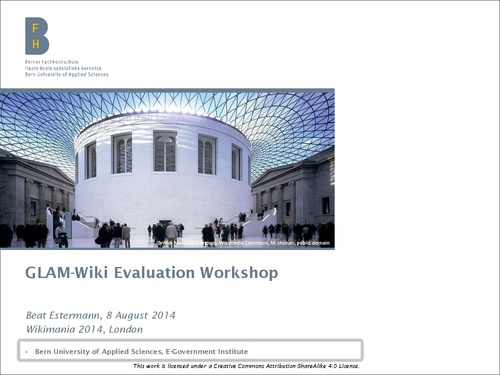The is a syndicated post originally published by OpenGLAM. The original version can be found here.
GLAM activities in the last two months have been quite happening! After Open Knowledge Festival in Berlin, OpenGLAM members and other GLAM contributors met again during Wikimania London, the official annual event of the Wikimedia movement focused on what people are making with wikis and open content. There were GLAM talks, workshops, discussions and brown bag talks: in this blog I’ll go into some of the highlights, but you can find an overview of all GLAM & Free culture submissions here.
Promoting OpenGLAM – Exchange of Experiences and Best Practices
OpenGLAM Working Group members Beat Estermann and Joris Pekel conducted a workshop during which they introduced the OpenGLAM working group and the various activities that members from different countries are involved in, such as the Open Cultuur Data masterclasses in the Netherlands and the Coding Da Vinci cultural data hackathon in Germany. For Switzerland, Beat Estermann talked about the OpenGLAM Benchmark Survey that aims to gather more information of open data principles in the heritage sector around the world.
Best practices for the evaluation of GLAM-Wiki cooperation
A GLAM-Wiki evaluation workshop was organized by Beat Estermann, Maarten Brinkerink and Wikimedia Foundation’s Program Evaluation specialist Jaime Anstee to assess the impact of the past GLAM projects and to create a road map by placing evaluation parameters in place for institutional collaboration. From the GLAM wiki residency project at Wikimedia UK, Jonathan Cardy presented the evaluation process needed in place for Wikipedia-in-Residence programs. Wikimedia Deutschland (WMDE)’s Lilli Iliev shared information about the evaluation practices WMDE has put in place in order to implement small to large scale GLAM projects in Germany. While working with various cultural institutions in Germany, they focused on qualitative aspects of the content acquired, on goal oriented programs like “GLAM on Tour,” and on mass outreach by popular media and post campaign impact measuring. Four groups were then formed to work on particular GLAM projects, how they plan to evaluate tangible output and measure return on investments.
Subhashish Panigrahi, Programme Officer, Access To Knowledge, Centre for Internet and Society

Can you help us translate this article?
In order for this article to reach as many people as possible we would like your help. Can you translate this article to get the message out?
Start translation


